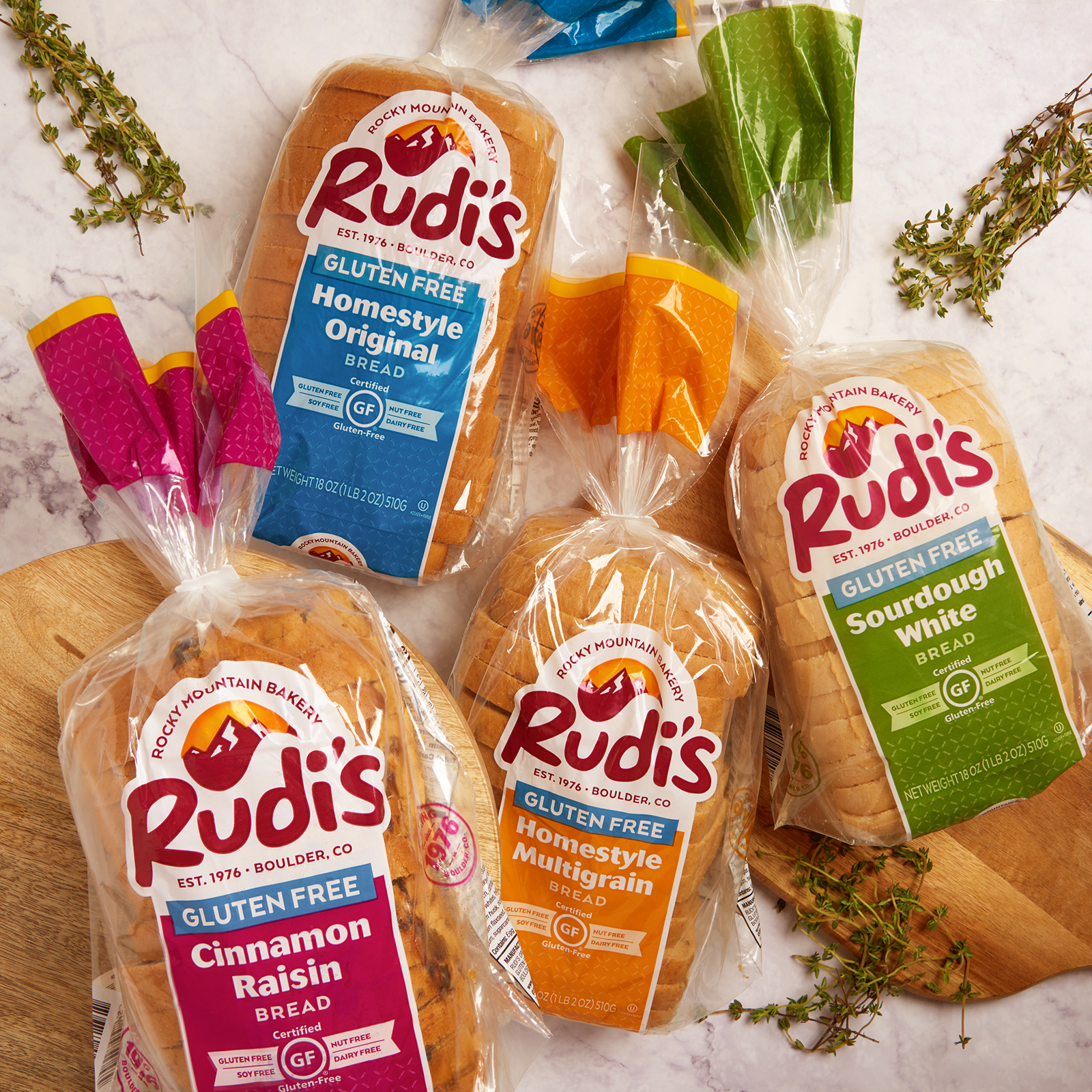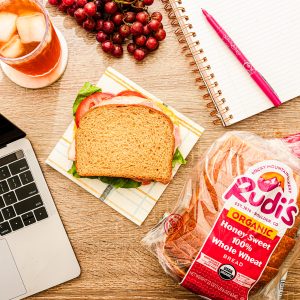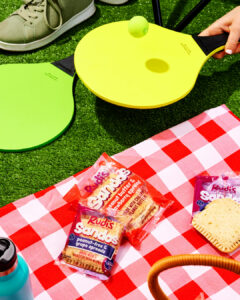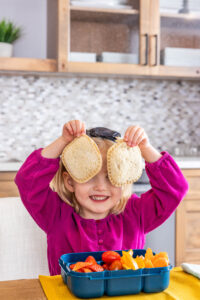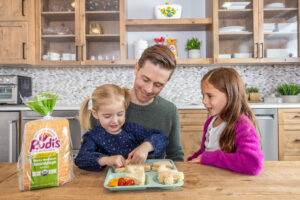Suzanne (Suzie) Murphy is Rudi’s keeper. Formally, she’s the VP of technical services and warehouse, which is a big job at a national bakery with as high of standards and as big of a distribution net as Rudi’s has. She oversees quality, food safety, and allergens in all of Rudi’s bakeries, on both the organic side and the gluten free side.
She’s also one of Rudi’s most tenured employees, having worked at the company for almost 25 years. “So I’m the unofficial company historian,” she jokes. “The keeper of secrets. The expert on all things Rudi’s bakery.”
It’s no coincidence that she sounds like one of the professors straight from Hogwarts castle, because Suzie brings a ministry of magic and science to her role. On the technical side, she keeps the bakeries in tip-top shape, ensuring everything that enters and leaves the warehouse meets Rudi’s high standards for quality and allergen safety. On the magical side, she does all of this while living with celiac disease, a condition that must strictly avoid gluten, the main component that gives bread its height and texture.
Rudi’s Bakery, based in Boulder, Colorado, is known for its high-quality sandwich bread (including sourdough bread, whole grain, and multigrain bread) as well as newer additions, such as breakfast sandwiches and Sandos.
An Interview With Rudi’s Head Of Quality Assurance And How She Helped Rudi’s Introduce Gluten-Free Bread
Registered dietitian Jessie recently sat down with Suzie to learn more about Suzie’s job at the bakery, Rudi’s history of gluten free breads, and how the company led the charge in setting protocols for separating allergens and creating nutritious AND delicious gluten-free bread long before the rest.
Jessie: “What was your job when you started at Rudi’s nearly 25 years ago?”
Suzie: “I had just moved to Boulder and had an associate’s degree in horticulture. It was the fall, so I was just looking for a winter job until I could work at a greenhouse the following summer. I started out as a temporary employee driving a forklift in the warehouse.”
Jessie: “But you never left to go back to horticulture. You stayed in the baking business.”
Suzie: “That’s right. I never left. I eventually took over the role of inventory management, and then I started working on our accreditations, such as non-GMO. Through that, I started working with organic certifiers and learned more about food safety, quality control, and allergens (such as dairy free or soy free). And, in 2009, when we started talking about adding gluten free products, I took ownership of that allergen management and how we could safely create certified gluten-free products in a gluten-full bakery because, at that point, we only had our organic wheat based products.”
Jessie: “That was a long time ago, nearly 15 years. And there weren’t many big bakeries that were offering gluten-free products at that time, so you really had to pave the way.”
Suzie: “That’s right, and it was difficult at first. In 2009 I really started working on the logistics of introducing gluten-free breads and obtaining gluten free certification through the GFCO.”
Jessie: “So how long did it take for Rudi’s to develop gluten-free bread that was allergen safe and up to the high standards of their organic bread line?”
Suzie: “We’ve been making organic bread since 1976, and then we introduced gluten-free bread in 2010. At that time, celiac disease was becoming a common term and people were starting to understand what it meant, and the number of people who were being diagnosed with celiac was increasing pretty steadily. Our first iteration of gluten free breads were really dense, more like cornbread. We just couldn’t nail it. So we brought on Rich Gallegos as our master baker, and he was the one who really nailed down our original gluten-free formulas.”
Jessie: “And what was your goal when introducing gluten-free products?”
Suzie: “Other brands, like Canyon Bakehouse gluten free, Dr. Shar, Udi’s, and Glutino were just starting to get into it. But we wanted to come up with gluten-free bread that was more than gluten-free … we wanted it to be more nutritious and delicious, and still be clean label, following the mission of our organic products, but making it safe for celiac people to eat.”
Jessie: “That’s a tall order. How did it go?”
Suzie: “It was very, very difficult. The texture was too crumbly or too rubbery, or too high in cane sugar, sea salt, or fat. So it really took months and months to make something we were proud of. Then in mid 2010 we finally made gluten-free bread that we loved and we all said ‘Yes, this is it! We like this and we can recreate this consistently.’ Because it’s one thing to create something in a test kitchen that’s fabulous, but then translating that to a commercial bakery and making it at scale – that can be very, very difficult, and it was. Those were hard months for us.”
Jessie: “But we’re so glad you stuck with it. Because the Rudi’s gluten-free breads you have today are outstanding. When did you officially open the dedicated gluten-free bakery?”
Suzie: “As our gluten-free sales grew, we were dedicating more and more days of the week to our gluten-free baking. And it was quite a process to change over. We really had to nail down the cleanup procedures in order to get our regular bakery to a gluten-free state. And we just weren’t able to keep up with demand on either the gluten-free side or our core business: the organic side. When we were only able to fulfill 62% of our organic orders one week, that was the trigger. We realized we couldn’t sustain that and we next needed a new facility that would only be dedicated to gluten free.”
Jessie: “And what measures do you take to ensure your gluten-free bakery avoids any cross contamination with your organic bakery.”
Suzie: “Well, they are two completely different facilities. There are no glutinous ingredients brought into the gluten-free bakery and there’s no gluten introduced to that equipment. When we receive our raw ingredients and packaging, the gluten-containing flours and ingredients are shipped, stored, and used completely separately from our gluten-free ingredients. We have segregated equipment, all segregated utensils, and everything is color coded so all of our operators know which bakery things belong in. Our gluten-free equipment doesn’t leave our gluten-free bakery. It’s not like we have to go to a central cleaning area where cross contamination could take place. We even have segregated forklifts and pallet jacks that stay in each designated bakery.”
Jessie: “And when you have the finished baked goods. How are you ensuring there’s no cross contamination as they leave your bakeries and make their way out into the world?”
Suzie: “Our baked goods are packaged and either put through our freeze-thaw program and shipped out that way, or they’re put into a tray and shipped fresh. Where we, again, have very distinct labeling with our internal distribution systems, so there’s no crossover of our organic products and our gluten-free products. Further, every production lot we produce is internally tested for gluten and, quarterly, sent out to a third party lab to verify less than 10 ppm of gluten so our consumers and retailers know the product is safe for their celiac consumers.”
Jessie: “You’re really confident in your operations and how you’ve been able to safely introduce gluten-free products on such a massive national scale.”
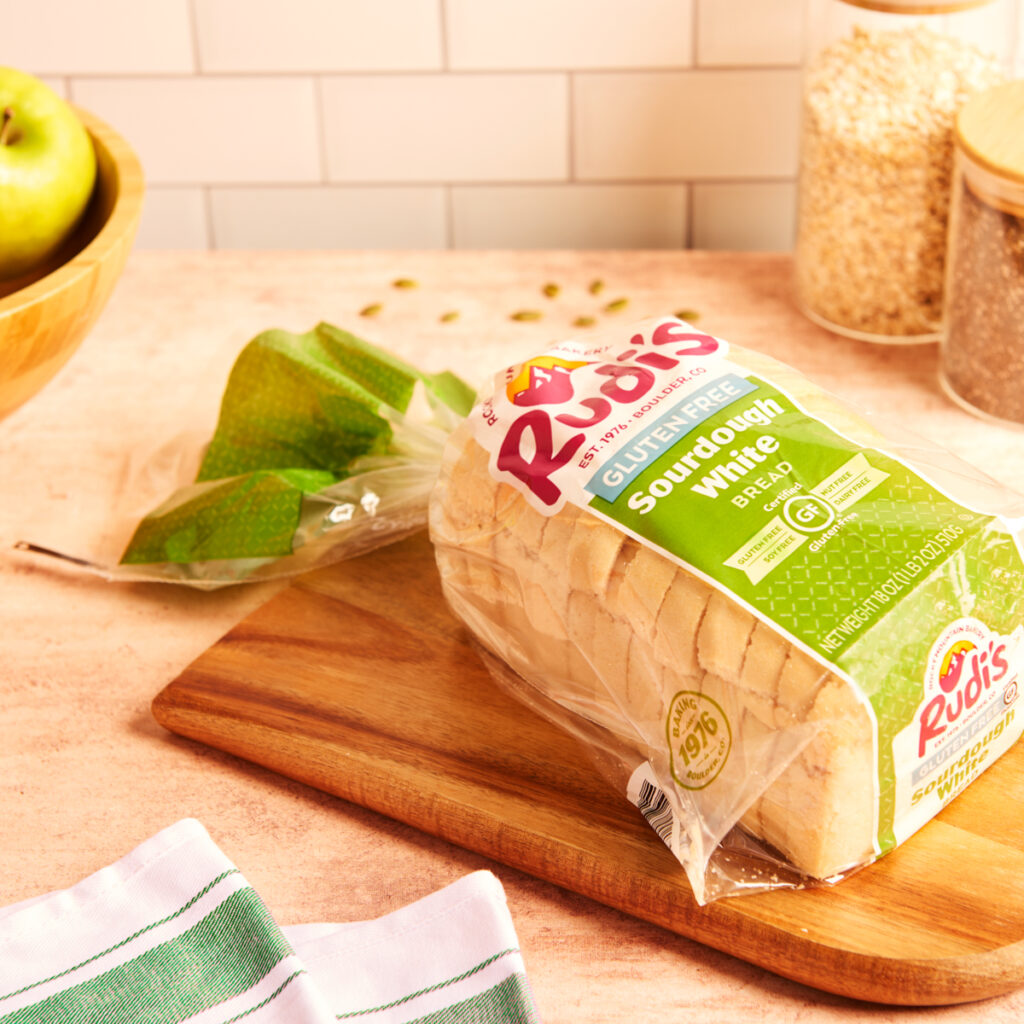
Suzie: “I am, and that’s really because of the unique experience and expertise of our operations team, many of whom have been a part of the Rudi’s family for 10 years or more. The core team has been in place for many years, and several of us ‘rose through the ranks’ together, learning and developing our programs over the years. I have to make special shout outs to Blanca Alvarado, our director of manufacturing who has been at Rudi’s for 22 years, Alejandro Tovar, our QA manager who has been here for 12 years, and Michele Ownes, our warehouse supervisor who has been here for more than a decade, and Andrew Eastwood, our maintenance manager who has been here for 19 years, plus several others. The longevity of our operations team and the decades of experience they bring really contribute to the success of our brand and the safety we offer to our consumers.”
Jessie: “And there’s probably no one better for the job of understanding the importance of labeling, testing, and certification of gluten-free and other allergen-free products than you, Suzie, because you have a diagnosis of celiac disease. What is it like to work in a bakery knowing that you can’t eat the gluten-filled carbohydrates?”
Suzie: “Well, 10 years before I was diagnosed, I found out that my daughter had celiac disease and she was just on the cusp of going off to college. So thankfully, because of her and because of my job, I had more understanding of what it was and what I needed to do. She ended up going to the University of Iowa where their cafeteria was gluten-free aware and had great accessibility for people with celiac. And when I finally cut out gluten from my diet, I understood even more about the symptoms I had been living with and didn’t even realize they were symptoms. There were a whole handful of them.”
Jessie: “Did your diagnosis change your approach to your job at all, and your gluten-free products?”
Suzie: “No, because of my daughter and my job, the standards of our gluten-free products has always been a high focus for me, even before my own diagnosis. But my appreciation for what we do for people with celiac and gluten sensitivity has increased, and it certainly changed how I did things at home. I had some emotional resentment at first, and I still do sometimes. When I smell our delicious bread from the organic bakery sometimes I’m like ‘Why? Why do I have to be gluten free?’”
Jessie: “You have quality control evaluations at the bakery every morning, where you and other employees examine the bread and other products, making sure everything is perfect from the taste to the serving size. What’s that like, knowing you can’t taste the gluten-containing products?”
Suzie: “Yeah, in our conference room every morning we have a daily operations meeting. We look at the products we made yesterday and the first products from off the line that morning. We measure it and discuss the attributes with our VP of R&D, our QA team, and our head bakers, and if there are any changes we need to make – maybe based on the environment that day or something else that’s going on, to make sure everything is up to muster. Others sample the bread, but I still feel it and smell it, with gloves on.”
Jessie: “Is there a gluten-containing bread that you really miss tasting?”
Suzie: “Yes, our Honey Sweet Whole Wheat. It’s really just the most delicious bread. It’s so good and I miss sampling it.”
Jessie: “And what’s your favorite gluten-free product that Rudi’s makes?
Suzie: “Hands down, it’s our brioche buns. It’s hard to even tell that they’re gluten free, and I love our new gluten-free breakfast sandwiches we make using those buns. They’re just so delicious.”
Rudi’s Bakery offers a variety of gluten-free breads, including Rudi’s gluten free cinnamon raisin bread, sourdough white bread, homestyle original bread, and more. See the full Rudi’s gluten free bread line up. With use of innovative ingredients, such as fermented rice starch, tapioca starch, sorghum flour, millet, brown rice flour, potato extract, and natural enzymes, the baking team is able to create great-tasting gluten free bread that has been loved by so many for so long.
Written by Jessie Shafer.
Jessie is a Registered Dietitian Nutritionist living in Colorado where she splits her time among nearby playgrounds, typing away at her trusty laptop, and heating up her home kitchen with delicious experiments. A former magazine editor-in-chief, Jessie has a long career in food publishing and health writing. She is currently the editor at The Real Food Dietitians and a nutrition consultant through her business crdible.

